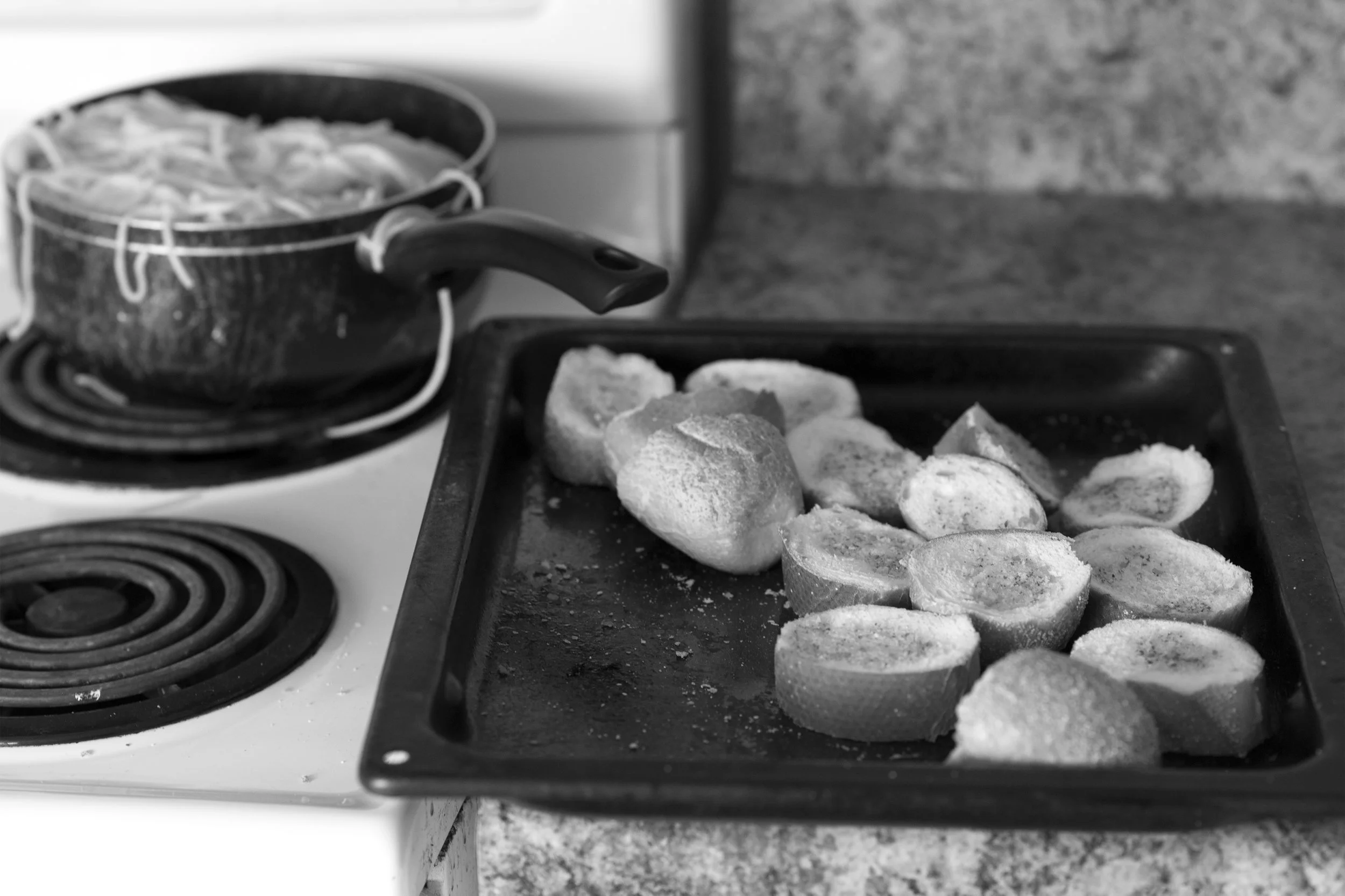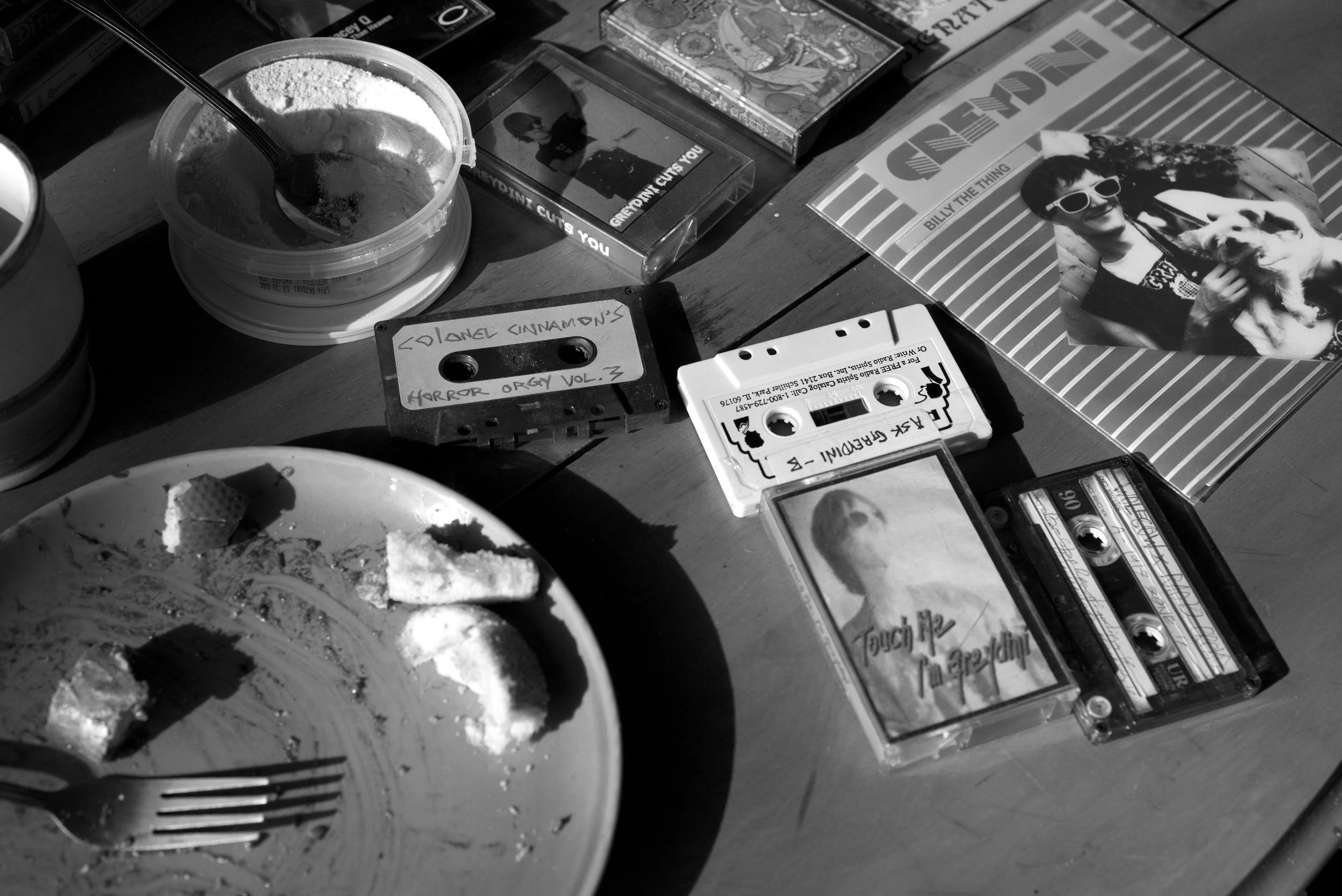IN GREYDYN'S KITCHEN
FROM MAY 2018 ISSUE OF WEST END PHOENIX
Musician Greydyn Gatti learned to cook as a kid while watching shows like Wok with Yan and The Urban Peasant. His newest record, Billy the Thing, is on the table the day he serves up one of his specialties, spaghetti and garlic bread, in his Junction apartment.
Today’s special: Pasta with Red Sauce
Junction musician Greydyn Gatti is a maker of many things: zines (more than 50), record albums (his newest is his 60th) and no-frills spaghetti, which he learned to cook as a little kid to help care for his sick mom. His approach in the kitchen, onstage and in life is consistent: Keep it simple, do it yourself, and always be as nice as possible
Greydyn Gatti has gone by many names in the 20 years he’s been a musician – Wolfcow, Colonel Cinnamon, Dolly Cheetah and his latest, Greydini – but none can top the name his father picked out for him before he was born.
“He wanted to call me Chainsaw. But then my grandma swooped in and suggested Greydyn.”
His dad, Gary, is an artist who went to OCAD in the ’70s. “He’s done album art for the Oshawa psych band Christmas, the Montreal hippie prog-rockers Dillinger and ’80s hair-metal goofballs the Killer Dwarfs.” It’s not surprising that his son would take a hands-on approach to his own albums, too; he’s recorded 60 of them during his career as an unconventional musician, working in what he calls “weird pop rock.” His latest record, Billy the Thing, is on the kitchen table at the apartment he shares with roommates in the Junction on the day I stop by for supper.
Greydyn has been simmering spaghetti sauce all day, a recipe he calls “Uncle Greydini’s downhome good pasta. Basically No Frills sauce. I try to make the easiest things possible.” In his small, basic kitchen he manhandles spaghetti noodles from a colander onto mismatched plates. Greydyn is not a chef, so plating is utilitarian: He ladles the meaty sauce overtop and serves it without fanfare. His ingredients aren’t snooty: ground beef, dried oregano, a jar of sauce from the grocery store. Dinner is served with glasses of Coke and a plastic tub of parm. Sunlight streams through the patio doors, beyond which I can see the deck he built himself, stacked with empties. He pulls a tray of garlic bread out of the oven and places a few slices on each plate.
Greydyn learned how to cook as a little kid, from watching Wok with Yan and The Urban Peasant on TV and from helping his dad cook when his mom was diagnosed with brain cancer when he was 10.
Greydyn grew up in Newmarket, where the Gatti family has lived for several generations. His grandmother Jeanne (the same one who chose his name) tells stories about her childhood there during the Depression.
The family soup, called Andy’s Soup, after his grandpa, was legendary. “My parents used to make this special barley soup, a recipe that my grandparents brought over from Hungary. When they’d make it, we’d eat it for a week. I’d come home, I’d smell it and I’d be like, ‘No! Not soup again!’ And all my friends would eat it and they’d be like, ‘Oh, this soup is so good. Why don’t you like this soup?’ I’d be like, ‘You don’t even know.’”
What about his last name, I ask. Gatti sounds Italian. “Some of my grandparents are from Hungary. If you ask my dad where my mom’s parents came from, he’ll say they crawled out from under a rock.”
This spaghetti doesn’t evoke memories of Hungary or Italy. It’s closer to New Jersey red sauce. We leave the plates on the counter when we finish. It is early afternoon, the roommates aren’t home and the house is quiet.
In his bedroom/studio the walls are lined with floor-to-ceiling shelves holding his extensive vinyl, tape and VHS collection. Any free wall space is filled with his dad’s art, including a painting of a giant skull, which hung over Greydyn’s bed as a kid.
Greydyn is a believer in doing things himself. In addition to pasta, he makes French onion soup, which he learned at his first job at “Newmarket’s Jack Astor’s knockoff,” the Algonquin Cottage Grill.
He also knows how to make zines; he produced his first one, The Newmarket Crap, in seventh grade. “It was potty humour – juvenile dumb shit,” he recalls. He continued making zines through high school, about music, politics and punk, churning out 50 or 60 in total.
He got into music early, starting to collect LPs and tapes at the age of 8 and teaching himself the bass guitar at 10. He also taught himself drums, keyboard and how to sing. “I never remember notes and can’t read music,” he laughs, “I just know chords from repetition.” He’s been a working musician for more than 20 years, but he’s never sought out a manager and books his own shows, rents rehearsal space and crafts his own album covers (with occasional help from his dad, who did the lettering on the latest EP).
I ask him why he hasn’t performed as Chainsaw. He admits that he’s thought about it. “I haven’t figured out exactly what I want to do with it, though, ’cause that’s a really special one, the name you were supposed to have but didn’t.”
In his 20s, he moved to B.C. for a while, but returned to Toronto for the music scene. “I could have really moved anywhere, but it’s too cold in Montreal, and there’s too many hippies in B.C. Toronto’s just the place to be. Everybody in B.C., the experimental guys, they all wore black metal band shirts and were all very serious about their music in this dark way and they’re just not funny, or fun to be around. I’m kind of a joker, and all the people here were jokers.”
While in B.C., running a hostel, he told his friends he planned to move to Toronto to start five bands. “People were like, ‘Yeah right, you’re not going to do that.’ Then I came here and did it. None of them is successful, but I never thought I’d be, like, famous from doing this anyway. It’s not like I’m going to be the next Sammy Hagar.” Far from it: His day job is researching files and mailing briefs for a law firm downtown.
He counts Buffy Sainte-Marie, Anton LaVey, the Plasmatics, the Fall and Hailu Mergia, the Ethiopian keyboard and accordion legend, among his greatest influences.
“When I heard Hailu, just the way he plays, he’s so free but controlled and really precise and has really good ideas. He played at all of the nightclubs in Ethiopia in the ’70s; this label Awesome Tapes From Africa put out his records. They’re the best thing. He really changed my idea of playing.”
The first time I heard Greydyn play he was onstage at the Gladstone Hotel, doing his own acoustic weirdo version of “A Gift” by Lou Reed. He has an unaffected way of playing that is so fun and kind that it’s addictive to watch. Greydyn reminds me of Peewee Herman, but with the sincerity of David Byrne, and he “plays” music in the childlike sense of the word. It’s less a performance than a free happy blast of sound that doesn’t follow any rules.
He regularly plays at Handlebar in Kensington Market and Cherry Cola’s on Bathurst and can always be found at the
Electric Eclectics festival in Meaford during the summer, where he performs, but also works as the volunteer coordinator by day and a member of the lifeguard team at night. “I carry a naloxone kit and make sure people in the dance tent are hydrated.”
Caretaking is a familiar role, he tells me, as we resume our places at the kitchen table. His mother, Linda, was diagnosed with a brain tumour in 1992 when Greydyn was 10. She had it removed. In April of ’93 it came back and the doctors told her she wouldn’t have long to live. “We didn’t want her to be in the hospital, so we moved the couches out and we got a hospital bed and we put it in the living room. We put curtains up so she could have some privacy and we just took care of her for the whole summer.”
His sister, Tashena, was 9. She didn’t understand what was going on.
“I remember when they told us she was going to die, I totally freaked out. And my sister was just sitting there, and she told me later, ‘I had no idea why you were freaking out. I didn’t understand.’ But I was pretty perceptive about it. I lost my grandfather in 1987 when I was 5 or 6. They said, ‘He’s dead.’ And I knew what that meant.”
He remembers his mom taking them out of school to go to Wonderland once a year. “It was a double whammy. We get to go to Wonderland and we get out of school!”
The summer that she was dying, he helped his dad cook for her.
“We tried to eat healthy, lots of fish and broccoli. She loved rice pudding, so we made that quite a bit. I remember watching movies with her and feeding her meals and talking to her. Those are good memories, even though they kind of suck. She fed me when I was born and I couldn’t feed myself, so when the tables were turned I fed her,” he says.
“The thing was, and I feel this way about my dad, too, it’s like, you sacrificed a lot to get me here and you helped me a lot. There’s nothing you wouldn’t do for me. So, that’s what I’ll do for you.”
“I hear so many people that are like, ‘I hate my mom, I hate my dad,’” he says. He tells them, “Don’t say that, because one day they’re going to be gone.”
“I always try to push that on people. Try to treasure the time you’ve got with them. They’ll say, ‘You have a different perspective, your mom’s dead.’ It doesn’t matter. Everyone’s mom is going to die, so be fucking nice to them. Just be nice. Is it so hard to be nice? I don’t think so.”




